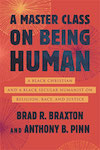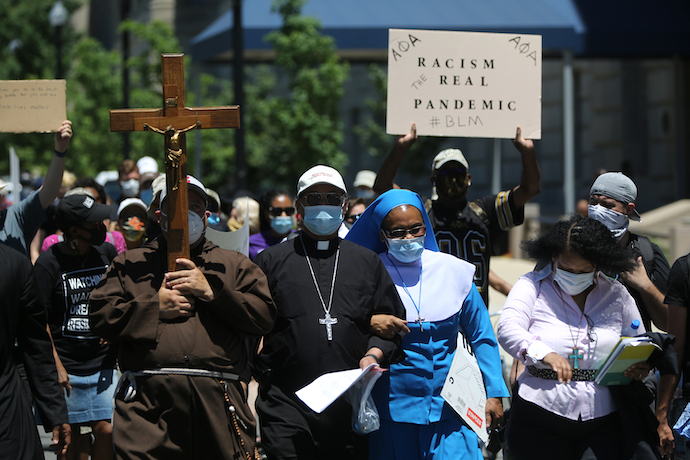While the nation’s highest court and one of the two major parties have been busy normalizing the enshrinement of conservative Christian values and privileges, the rest of us broadly agree that the U.S. Constitution both protects the personal relationship with religion and proscribes the establishment of a state religion. But that leaves quite a bit of room for discussions over the precise role that religion should play in the shaping of our laws and values.
Anthony Pinn, a secular humanist, is “okay with individual Christians… being guided by faith as they move to the ballet box,” though he expresses concern “about the church claiming space in the public arena.” Even if the most progressive Christian values are driving decisions, he asserts that “Democratic ideals aren’t synonymous with Christian—or even ‘religious’—ideals.”
Brad Braxton, a Christian theologian and pastor, agrees that Christianity doesn’t possess “a unique or inherent capacity to provide moral guidance” and that “Christians [ought to] be humble, morally aware (not morally arrogant) contributors to public well-being,” but he argues that “In authentically democratic spaces, a plethora of religious, spiritual, and ethical traditions should be welcomed into the public sphere to make their respective cases about their possible contributions to our collective well-being.”
Is this possible in a nation whose population is overwhelmingly Christian? Is it reasonable, on the other hand, to ask that religious people refrain from using their own language and codes to shape the public? In this excerpt from their book-length conversation, Pinn and Braxton each make a compelling case.
BRAXTON: Hatred and violence batter every part of the globe. Economic downturns constantly threaten the security of families. The COVID-19 pandemic, cancer, and diabetes continue to send people prematurely to the cemetery. Many children in our schools are failing, even as billions of dollars are spent to strengthen the prison system. Environmental toxins poison precious natural resources. These dilemmas do not allow religious or secular people to remain locked in their “ivory tower” abstractions.

A Master Class on Being Human: A Black Christian and a Black Secular Humanist on Religion, Race, and Justice
Anthony Pinn & Brad Braxton
Beacon Press
July, 2023
BRAXTON: A “grammar of compassion”—that’s a beautiful phrase. The world surely needs more compassion. I won’t begrudge people about whether their motivation for compassionate problem-solving arises from religious or secular sources. We just need to address these public problems.
When teaching in divinity schools and seminaries, I remind students that prophetic religion involves more than simply naming social problems. Constructive and imaginative activism articulates and embodies promising possibilities beyond the problems.
Nonviolent cooperation between diverse religious groups can heal gang-ridden neighborhoods and unite war-torn nations. Strategic philanthropy can enhance employees’ job skills and encourage employers’ job creation. Congregational partnerships with medical institutions can provide more low-cost, healthcare options for uninsured or underinsured persons. Children’s minds can be liberated, instead of their bodies being incarcerated.
Regulations to ensure the environment’s clean bill of health can be enacted. The aim of prophetic activism is abundant life for all forms of life on this marvelously diverse planet! My comments are buttressed by a fulsome understanding of real-world “salvation.”
PINN: My sense of salvation is also consistent with the “real world.” As a secular humanist, I wouldn’t advance a Protestant theologically-derived view of the human and the human in the world. I also appreciate what you are saying concerning “prophetic religion.” Individuals and communities should have the right to dedicate themselves to a religious orientation. The Constitution safeguards this personal relationship to faith. However, this is different from saying that a prophetic religiosity can shape the public arena.
True, Christians, in this case, might be motivated by their prophetic sensibilities, and they might vote accordingly. But this should remain a matter of personal—and religious community—engagement. The public arena should be more robust and more reflexive of democratic ideals. My aim isn’t to prevent people from being religious.
Also, to the extent that people are religious, the more progressive and prophetic they are, the better. However, I am advocating for a public space and public policies that are grounded in democratic ideals as opposed to being driven by religious—even the most progressive—religious ideals. Democratic ideals aren’t synonymous with Christian—or even “religious”—ideals.
BRAXTON: Don’t get it twisted. I’m just as interested as you are in diverse, secular, democratic public spaces and public practices. I’m simply trying to articulate how people with progressive and prophetic religious commitments might contribute to, not dominate, those spaces and practices.
Jesus exhorted his followers to be “pure in heart” and operate with integrity in private and public spaces. People who are “pure in heart” still stumble and fall. Their lives still bear the marks of hand-to-hand combat with temptation. According to Jesus, the pure in heart strive to make their outward practices embodiments of their inner principles. People of integrity know that the profession of one’s lips and the production of one’s life ought not be in radical disagreement. Religion has a role to play in public, especially if religion has integrity and thus enables piety and politics to embrace in ways that enhance life for as many people as possible.
PINN: You say, “If religion has integrity . . .” The “if ” here is too substantial for me. I believe that new mechanisms of discourse and delivery can offer whatever benefits religion might offer in public without the theological pronouncements and assumptions. The United States has operated with an assumption that religion—and particularly the Christian church—has a unique quality, that there is something about the Christian church that imbues it with capacities unmatched by other institutions, that the Christian church is in public because it is uniquely qualified to guide the moral and ethical steps of the nation. I wouldn’t deny the right of folks to practice their faith on the level of individuals or even in communities of the like-minded. Still, I’m not convinced it is necessary (or useful) to charge those communities with public responsibilities and authority.
BRAXTON: We disagree about many things. Yet I completely agree with your critique of the unwarranted privileging of Christianity in the United States. Neither theism in general nor Christianity in particular has a unique or inherent capacity to provide moral guidance, especially for a broad, diverse public. In authentically democratic spaces, a plethora of religious, spiritual, and ethical traditions should be welcomed into the public sphere to make their respective cases about their possible contributions to our collective well-being. I respect your opinion about permitting the practice of religion in individual and communal spheres, while “restricting” religion’s influence in the broader public sphere.
However, within the guardrails of legal statutes about “religious freedom” (e.g., prohibiting religious practices that harm others), each religious, spiritual, and ethical tradition should be allowed to determine what public engagement its adherents might (or might not) pursue. A public sphere devoid of religious people is no better than previous Christian attempts, for example, to “rid” the public sphere of secular people. As a publicly engaged Black Christian theologian and pastor, I’m interested in principles and practices that enable fellow Christians to be humble, morally aware (not morally arrogant) contributors to public well-being.
I’ve raised the question: What happens when piety and politics embrace? My father’s remarkable life offers a practical answer to the question. During the 75 years he lived, he embodied the noble struggle of bringing piety and politics together. My father was a Baptist pastor in Virginia for more than 45 years. He was deeply committed to Jesus and to civic engagement and social justice.
On most Sundays during my childhood, my father passionately preached to a warm congregation of earnest Black people in the Blue Ridge Mountains of Southwest Virginia. Yet I have equally vivid memories of my father’s passionate commitment to the Citizens League, a group of people in my hometown who met regularly on many Mondays to discuss and enact tangible ways to improve civic life—from poverty eradication to voter engagement. The faithful piety my father exhibited on Sunday compelled him to engage in freedom-expanding politics on Monday. While I’ve made mistakes aplenty in my life, I’m trying to acquaint my “Sunday” with my “Monday.” I want my piety to embrace my politics.
PINN: I appreciate the personal narrative. It reminds me of the power of the personal to provide orienting moments. I also see, through the compelling example of your father, how—on the personal level—connections between faith and politics are mapped. My concern is with scaling up from the individual to the organizational. I’m okay with individual Christians, for example, being guided by faith as they move to the ballet box. I, however, wonder about the church claiming space in the public arena. I’m not convinced it’s a good move.
When and where has such a public presence of the church benefited those outside the “grace” of the church? What about people in the public arena who adhere to other traditions? Are they to bracket their religiously-inspired framing of life to participate in a “Christianized” public? What about the most despised—atheists and humanists? How does this religiously-positioned public speak a democratic possibility that is inclusive and robust?…
I want to be clear. I’m not opposing religious people in public using their beliefs to ground their actions. I’m opposing religion providing the language and codes that shape the public. The public, I’ll say again, should be a secular space.
BRAXTON: Let me say again, I gladly embrace a secular public sphere. Yet in a secular public sphere that is democratic, no singular person or group should decide what language and codes will shape public discourse and practice. As diverse individuals and groups engage, debate, and persuade one another, decisions about religion’s public role should be made in public by the public. As we listen to and talk with many beautifully diverse people in the public sphere, all of us will have more opportunities to appreciate our similarities and celebrate our differences. In the creative tension of this appreciation and celebration, we all might become better humans.
This excerpt from A Master Class On Being Human: A Black Christian and a Black Secular Humanist on Religion, Race, and Justice is reprinted with permission from Beacon Press.


